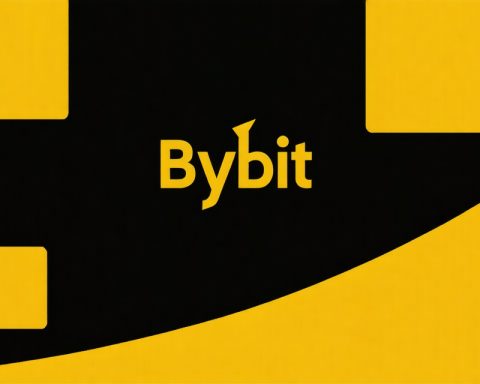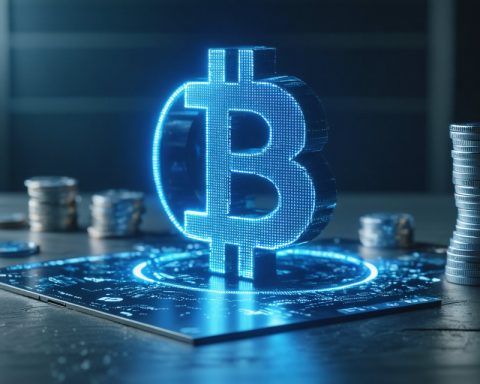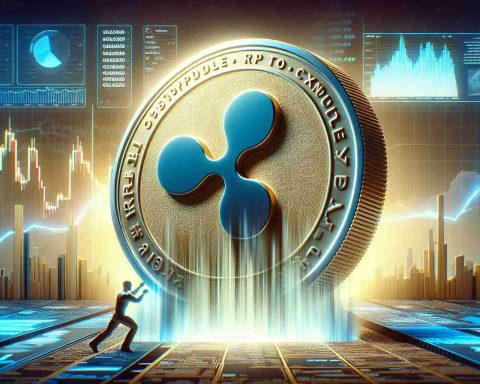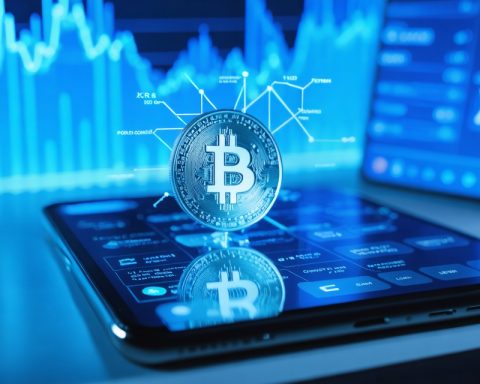- GameStop is exploring cryptocurrency investments to redefine its market value, particularly in bitcoin.
- CEO Ryan Cohen’s strategic moves aim to innovate and potentially emulate success stories like MicroStrategy’s bitcoin ventures.
- GameStop initiated crypto wallets in 2022 but paused due to regulatory challenges; the company now re-evaluates its crypto strategy.
- The retailer holds a substantial $4.6 billion cash reserve, providing a strong base for potential digital currency investment.
- Despite speculation, bitcoin advocate Michael Saylor is not currently part of GameStop’s crypto strategies.
- GameStop’s considered shift to cryptocurrency reflects an adaptive approach to a rapidly changing retail and gaming environment.
Beneath the iconic GameStop logo in bustling Cologne, a transformation quietly brews. The legendary video game retailer, once a titan of brick-and-mortar shopping, is now eyeing an audacious leap into the realms of cryptocurrency. As murmurs about GameStop’s potential bitcoin investments buzz through the market, shares have already begun a skyward ascent.
Amidst flickering screens and calloused game controllers, GameStop contemplates a future intertwined with digital currencies like bitcoin. While decisions remain fluid, the idea signals a profound shift in how the company might redefine its value in a rapidly evolving industry. Last weekend’s snapshot of CEO Ryan Cohen alongside bitcoin advocate Michael Saylor may have fueled excitement, although insiders clarify that Saylor isn’t folding into GameStop’s crypto strategies just yet.
This isn’t GameStop’s first dance with digital assets. The company inaugurated crypto wallets back in 2022, before regulatory headwinds forced a retreat. Now, bolstered by a $4.6 billion cash reserve, GameStop ponders its next chess moves on the strategic board of investments.
Ryan Cohen, who once reinvigorated consumer darling Chewy, has spent years resetting GameStop’s trajectory, paring down costs, and tightening operations to navigate a challenging landscape. As gamers shift their spending, Cohen’s bold consideration of cryptocurrency investments could represent exactly the kind of innovation GameStop needs.
GameStop’s potential pivot mirrors pathways carved by companies like MicroStrategy. With volatile yet rewarding outcomes, leveraging bitcoin has reshaped such entities’ profiles. The real takeaway? GameStop’s next high score may not be from a new game release, but from a calculated bet on digital gold.
The Hidden Moves Behind GameStop’s Leap into Cryptocurrency: What You Need to Know
How GameStop is Adapting to Cryptocurrency
GameStop, traditionally known as a powerhouse in the video game retail landscape, is expanding its strategy with a forward-thinking look into cryptocurrency. As industries worldwide shift toward digital finance, GameStop’s exploration into bitcoin investments could redefine its market presence and performance.
Real-World Use Cases
1. Diversification of Assets: By investing in bitcoin, GameStop aims to diversify its assets. This could act as a hedge against traditional market volatility.
2. Enhanced Customer Engagement: Accepting cryptocurrency as payment could attract tech-savvy customers and gamers who prefer digital transactions.
3. Strategic Advantage: Firms like MicroStrategy have already leveraged bitcoin to reinvent their business model, suggesting a possible positive trajectory for GameStop. MicroStrategy’s embrace of bitcoin led to heightened market interest and valuation improvements (Source: Forbes).
Market Forecasts & Industry Trends
The cryptocurrency market is expected to continue its expansion, with bitcoin playing a significant role. Analysts forecast the global blockchain market to grow from $7.8 billion in 2022 to $163 billion by 2027 (Source: MarketsandMarkets). GameStop’s move into crypto aligns with industry trends focusing on blockchain technology and digital tokens, potentially placing it as a frontrunner among retailers adopting these technologies.
Features, Specs & Pricing
GameStop’s crypto strategy could involve:
– Crypto Wallets: Already explored in 2022, these would facilitate easy transactions and storage of digital assets.
– Bitcoin Payment Integration: Providing systems that allow consumers to transact using cryptocurrency.
Pricing strategies will likely need to adapt to include volatility buffers due to the fluctuating nature of bitcoin values.
Controversies & Limitations
1. Regulatory Challenges: GameStop must navigate complex legal frameworks regarding cryptocurrency, which vary widely across regions.
2. Volatility Risk: Bitcoin’s price can be highly volatile, presenting significant financial risks if not strategically managed.
Security & Sustainability
GameStop must prioritize:
– Security Protocols: To protect customer data and funds.
– Sustainable Practices: Considering the environmental impact of crypto mining, GameStop should explore sustainable options, such as partnerships with eco-friendly blockchain networks.
Pros & Cons Overview
Pros:
– Potential for higher returns due to bitcoin’s appreciation.
– Increased market visibility and renewed customer interest.
Cons:
– High risk from price volatility.
– Potential regulatory hurdles and compliance costs.
Actionable Recommendations
1. Start Small: Begin with pilot projects to test the waters of cryptocurrency acceptance and investment.
2. Educate Consumers: Provide clear information on the benefits and risks of using cryptocurrency at GameStop.
3. Monitor Regulations: Stay updated on legal changes and adapt strategies accordingly to ensure compliance.
For the latest cryptocurrency news, visit CoinDesk.
Conclusion
GameStop’s strategic exploration into the cryptocurrency realm represents both an opportunity and a challenge. By carefully balancing innovation with risk management, the company can leverage digital currencies to potentially unlock new market potential and sustain its relevance in an evolving digital economy. As the industry changes, those prepared to adapt stand to benefit the most.













